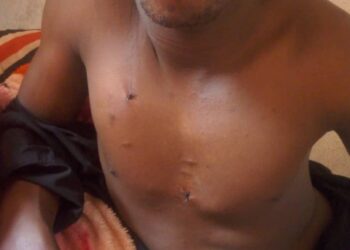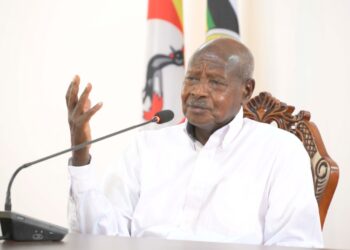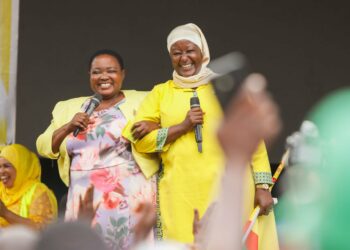The military regime in Sudan has launched a new wave of arrests and violent intimidation in an effort to undermine opposition plans for a widespread campaign of civil disobedience.
Pro-reform groups have warned of a “frenzied campaign launched by the military junta to arrest political activists and revolutionaries” this weekend ahead of a general strike set to start on Sunday.
Professionals, including bankers, doctors, air traffic control staff, pilots, electrical engineers and economists, have been targeted by intelligence services in what the Sudanese Professionals Association, one of the main opposition groups, said was an “obvious attempt” to break the strike.
“In the face of these repressive developments, we call upon the workers in the private and public sectors to strictly adhere to the [campaign] of civil disobedience and the general strike. These peaceful means are a way to cherish the blood of the martyrs [and] protect the lives of colleagues,” the group said in a statement.
More than 120 people died and hundreds were injured when paramilitaries attacked a protest camp in the centre of Khartoum on Monday.
Activists say that the total number of people detained by security services in recent days is unclear, but is “probably in the hundreds”.
Two opposition leaders who met the Ethiopian prime minister, Abiy Ahmed, in Khartoum on Friday have been detained, along with an opposition spokesman. But scores more arrests and detentions have gone unreported, opposition groups in Khartoum say.
Abiy was in the Sudanese capital to mediate between the opposition and the ruling Transitional Military Council (TMC), which seized power when the dictator Omar al-Bashir was ousted in April after months of mass protests.
Talks between the opposition Declaration of Freedom and Change Forces (DFCF) alliance and the TMC, over who will lead a transition period before elections, had ground to a halt, then collapsed altogether after the raid on the protest camp. “The problem is that the figurehead of the regime was removed but the regime remained in place. There are elements that haven’t understood that; they can’t rule in the same ways as before, given the breadth and depth of the protest movement,” said Murithi Mutiga, an analyst with the International Crisis Group in Nairobi.
The deaths on Monday have been blamed on the paramilitary Rapid Support Forces (RSF), which is largely made up of militias accused of systematic human rights abuses during the war in Darfur. The force is led by Mohamed Hamdan Dagalo, known as Hemedti, who also serves as the deputy head of the TMC.
Witnesses to Monday’s violence told the Observer that many protesters drowned after jumping into the Nile when the RSF charged through the camp, shooting and beating unarmed civilians.
An association of medical professionals in Khartoum said that the RSF had retrieved 40 corpses from the river and taken them to be disposed of elsewhere.
Other bodies were later found by residents and activists. Many had been attached to heavy concrete blocks in an apparent effort to sink them.
Mohamed, a protester, said he saw about 50 people jumping from the famous Blue Nile bridge. “There was gunfire at the same time. Some of [the RSF] also carried some bodies and threw them into the Nile, just to open the bridge and let the other forces come,” he told the Observer.
Ahmed, a 40-year-old father of three, said that he had responded to a call from protest organisers to gather at the sit-in site when it became clear that security forces were preparing to attack.
“The RSF shot at me and I was hit in the arm,” Ahmed said. “I was taken to the clinic, but while I was there getting the treatment, the RSF came and they searched my phone and me, even though I was injured. They beat the doctors and humiliated them, and shot one.”
Ibrahim, 32, was fleeing the protest camp when he was shot in the hand. “I was one of the last ones who left the sit-in. There was so much gunfire. Then they fired teargas at us and kept firing, and then I couldn’t feel my hand any more and I saw a lot of blood coming out,” he said.
With a makeshift dressing on his wound, Ibrahim walked to the nearest hospital, but had to wait among hundreds of other casualties for 12 hours before overwhelmed staff could attend to him.
There are also many reports of rapes and other sexual assaults during the attack on the camp on Monday.
The internet remains cut off in Khartoum with other communications also significantly restricted. There are long queues for fuel and bread, and roads have been blocked by makeshift barricades in many neighbourhoods.
Security in much of the city is deteriorating, with residents fearful of thieves and the RSF.
“It feels like we are in prison. There is no internet, no way to go out, power cuts so we can’t watch television. Last night we heard there were gangs coming for us,” said Nasra, a 23-year-old university student.
Experts fear that divisions among the military rulers could lead to violent clashes and a spiral into anarchy.
“The bloody massacre means the TMC has lost a lot of credibility and needs to offer concessions, even if that is hard,” said Mutiga. “It is also very difficult to persuade the civilians to come back to the table. But there needs to be a deal, and quickly.”
Source: The Guardian
Do you have a story in your community or an opinion to share with us: Email us at editorial@watchdoguganda.com











